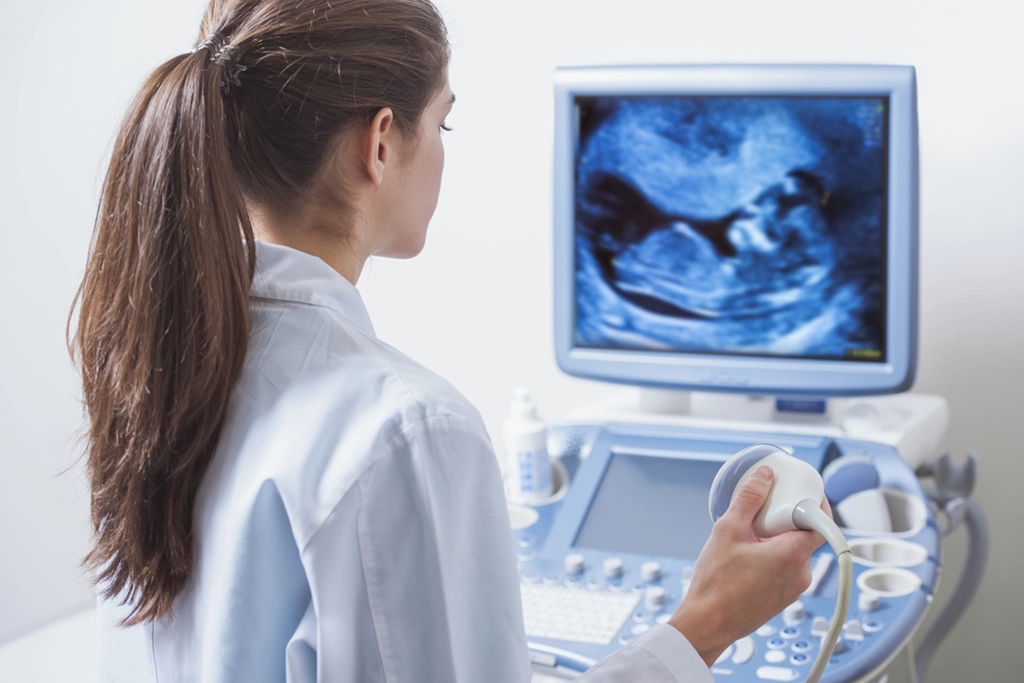What Can An Ultrasound Detect?

An ultrasound is a noninvasive imaging study that uses powerful sound waves to show various structures of the human body. A popular misconception is that ultrasound is only used to assess the health of a soon-to-be mother during each stage of her pregnancy. An ultrasound can serve many purposes. Various diagnostic and therapeutic techniques have been developed using ultrasounds. Let’s discuss the abilities of ultrasounds in Cherry Hill, NJ, and what medical conditions they detect.
How Does An Ultrasound Work?
Before diving into everything an ultrasound can detect and its true capabilities, it is important to understand how an ultrasound works. During an ultrasound study, a technologist will apply a gel on the skin of the affected area. A probe/wand called a transducer is gently rubbed against the gel. As the transducer moves across the gel, sound waves are produced and passed through the soft tissue. Eventually, the sound waves will bounce back as the tissue gets denser. As the sound waves travel back, an image is created. An ultrasound can be used to create images of numerous parts of the body including:
- Muscles, joints, and tendons,
- Thyroid
- Bladder
- Heart and blood vessels
- Pancreas
- Reproductive organs
What Kind Of Conditions Can An Ultrasound Detect?
An ultrasound can help physicians diagnose medical conditions related to your tissues or organs. If a patient has a medical condition affecting their bones, an ultrasound can be used to determine the status of bone health. Here are a few conditions an ultrasound can detect:
- Thyroid conditions: A physician may order an one to evaluate the state of your thyroid. This study can detect abnormal thyroid growth and activity to determine if further intervention is needed.
- Cardiovascular conditions: An ultrasound is very efficient at visualizing soft tissue and fluid within the body. Blood vessels can be seen on ultrasounds to determine if blockages or other abnormalities are present.
- Uterine fibroids: Fibroids and other conditions of the female reproductive system can be detected with the use of ultrasounds.
- Tumors and cysts: An ultrasound can detect tumors and cysts by identifying abnormally dense areas of tissue. Tumors and cysts are shown differently on the images, so an accurate diagnosis is made.
Is It Safe?
Ultrasounds have been utilized in diagnostic and advanced imaging for more than eight decades. Since ultrasounds use sound waves rather than small doses of radiation, ultrasounds are known to have one of the best safety records of any imaging study. Other imaging studies, such as X-rays use, very small doses of radiation while ultrasound uses none. This removes a lot of the rare risks you could experience from other imaging studies. If you have any concerns regarding the safety or efficacy of ultrasound, please reach out to your doctor.
South Jersey Radiology Associates offers general and specialty ultrasounds that can provide the answers you are looking for. If you are interested in scheduling your appointment with SJRA, reach out to any of our following locations:
- Cherry Hill Office – Cherry Hill, NJ
- Greentree Office – Marlton, NJ
- Haddonfield Office – Haddonfield, NJ
- Turnersville Office – Turnersville, NJ
- Route 73 Office – Voorhees Township, NJ
- Voorhees Office – Voorhees Township, NJ
- Washington Township Office – Sewell, NJ
- Women’s Center at Cross Keys – Sewell, NJ
- Women’s Center at Voorhees – Voorhees Township, NJ
- Women’s Center at Virtua – Voorhees Township, NJ
- West Deptford Office – West Deptford, NJ
Learn more about the board-certified sub-specialized radiologists who read and interpret studies at SJRA here.
Frequently Asked Questions
During an ultrasound study, a gel is applied to the skin of the affected area, and a transducer (probe/wand) is used to emit sound waves. These waves pass through the soft tissues and bounce back as they encounter denser structures. The returning waves create an image, allowing visualization of various body parts such as muscles, joints, tendons, thyroid, bladder, heart, blood vessels, pancreas, and reproductive organs.
Ultrasound can aid in the diagnosis of medical conditions related to tissues or organs. It can detect and evaluate conditions such as thyroid abnormalities, cardiovascular issues including blockages, uterine fibroids, and other reproductive system conditions, as well as tumors and cysts by identifying abnormal areas of tissue density.
Ultrasounds have been used in diagnostic imaging for over eight decades and are known for their safety. Unlike imaging techniques that use radiation, ultrasounds employ sound waves, eliminating the risks associated with radiation exposure. Ultrasound has one of the best safety records among imaging studies. If you have concerns about safety or efficacy, it is advisable to consult with your doctor.
You can schedule an ultrasound appointment at the following locations:
- Cherry Hill Office – Cherry Hill, NJ
- Greentree Office – Marlton, NJ
- Haddonfield Office – Haddonfield, NJ
- Turnersville Office – Turnersville, NJ
- Route 73 Office – Voorhees Township, NJ
- Voorhees Office – Voorhees Township, NJ
- Washington Township Office – Sewell, NJ
- Women’s Center at Cross Keys – Sewell, NJ
- Women’s Center at Voorhees – Voorhees Township, NJ
- Women’s Center at Virtua – Voorhees Township, NJ
- West Deptford Office – West Deptford, NJ
Our team of board-certified, sub-specialized radiologists reads and interprets all ultrasound scans. You can find more information about these radiologists by visiting our physician profiles.
